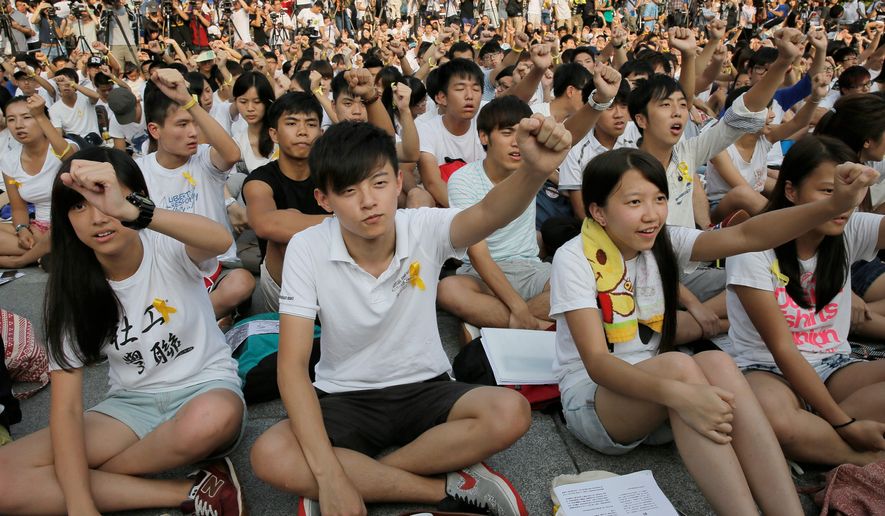HONG KONG — Thousands of university students waving yellow ribbons and “Democracy Now” banners boycotted their classes Monday to protest Beijing’s decision to maintain control over Hong Kong elections, marking an escalation of the city-island’s pro-democracy movement that now is taking aim at local pro-China billionaires.
Chanting “Reject fake elections,” the students marched at Chinese University and said their boycott will continue all week as they gather en masse at government offices and headquarters. The protesters said it’s the first phase of a battle that will include occupying Hong Kong’s central business district in the next few weeks to tell the city’s elite to stop backing China.
Meanwhile, dozens of Hong Kong’s top business leaders are meeting with China’s Communist Party officials in Beijing to discuss shoring up support for Chinese policies in the semi-autonomous city-state.
The activists said they won’t stand down until they get results.
“I believe a fight for democracy is a war,” said Chan Kin-man, a leader of a group called Occupy Central, which is spearheading the protest in the financial district. “The occupation of the central business district is just one battle.”
“In the long run, Hong Kong needs a stronger civil society,” he said.
SEE ALSO: RAHN: Hong Kong, an aspirational society to emulate
China took control of the British colony in 1997 and granted Hong Kong certain civil liberties via a mini-constitution and the expectation of free elections in 2017 for its top leadership post. Planning for the vote started late last year.
But in proposed guidelines for the vote published in late August, Beijing’s leadership granted the “one man, one vote” rule but nixed an open nomination process for candidates for the city’s top post of chief executive.
China wants to limit the number of candidates and make sure those selected are vetted by a committee the way it currently is done — by pro-Beijing elites — which essentially leaves the top post under the control of the mainland Communist Party.
Activists say China’s requirement that Hong Kong candidates be screened is unacceptable.
“Pre-selected candidates by a controlled nominating committee can only represent vested interests, not the general public’s,” Alex Chow, secretary-general of the Hong Kong Federation of Students, said Monday at a student rally at the Chinese University of Hong Kong.
Since the guidelines were released last month, pro-democracy activists have been planning protests and the upcoming boycott/occupation of the financial district, and recruiting locals to their cause. They held an initial protest Sept. 14 with about 4,000 demonstrators.
Student organizers expect the boycott to double that number: The Hong Kong Federation of Students says 24 colleges and universities and about 8,000 students are planning to participate.
“This is the biggest class boycott in Hong Kong history,” said Tommy Chung Sau-yin, president of the student union at Chinese University. “I believe the participation of the young can motivate the adults to join the movement. That has happened before.”
At the same time, students at the City University of Hong Kong have started a “one man, one letter” campaign writing individual letters to Chinese President Xi Jinping explaining their support for the boycott.
The boycott is supported by 520 academics from universities and colleges across the city, who signed a joint statement and said their reaction to Beijing’s proposals is one of “no less than extreme disappointment and indignation.”
A second round of public consultation on democratic reform starts in October, but the pro-democratic lawmakers in the Legislative Council say they will boycott it. Beijing’s proposal leaves too little room for discussion, they say.
Leung Chun-ying, chief executive of Hong Kong, has urged lawmakers to accept the deal. He argued that the cost of giving it up is too high.
“I hope the pro-democratic legislative members can cherish the chance of having the vote in 2017. The cost of giving up this chance is too high,” Mr. Leung wrote in a letter published in United Daily News, a Taiwanese newspaper.
At the same time, Hong Kong’s business elite meeting with Mr. Xi to discuss democratic reforms say Chinese leaders will stand by its conditions for elections. They pleaded with protesters to recognize the consequences of the boycotts and strikes.
“Hong Kong is a financial center and if the city’s main financial district is in chaos, then Hong Kong will be ruined,” billionaire property developer Lee Shau-kee told reporters in Beijing.
Demonstrators plan to occupy the Asian financial hub’s central business district as early as Oct. 1, Chinese National Day. Protesters will include Legislative Council members, scholars, lawyers, doctors and priests.
“We shall see in the next few months, if the will of the people can make the Chinese leaders change their mind,” said Mr. Chung, the student union president. “If we can push public opinion, this will create big pressure on Beijing.”
If not, the students say, it will be time to escalate.
“If the Chinese government doesn’t change its decision, we will take stronger action,” said Joshua Wong, leader of Scholarism, a pro-democracy student group.
Even the youngest students are taking part in the boycott, he said, adding that students from 50 elementary and secondary schools will go on strike.
“I don’t think age is a problem,” said 12-year-old Eren Chak, who is planning to protest. “Compared to adults, I might care even more. Everyone is responsible to do good for our society.




Please read our comment policy before commenting.